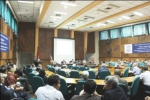Prof. Sidik Permana's Scientific Oration: The Vital Role of Nuclear Energy in Achieving Zero Emissions in Indonesia
By Anggun Nindita
Editor Anggun Nindita

BANDUNG, itb.ac.id - The Professors Forum of Institut Teknologi Bandung (FGB ITB) organized a scientific oration for professors on Saturday (17/2/2024) at the West Hall, ITB Ganesha campus. Prof. Dr. Eng. Sidik Permana, S.Sc., M.Eng. was among the speakers representing the Faculty of Mathematics and Natural Sciences (FMNS).
He delivered an oration entitled 'The Role of Nuclear Energy in Supporting Net Zero Emissions in Indonesia: The Importance of Nuclear Non-Proliferation and the Use of Advanced Reactor Technology and Its Implementation'.
Prof. Dr. Eng. Sidik Permana, S.Si., M.Eng., born on May 11, 1978, in Bandung. He joined the Nuclear Physics and Biophysics Research Group, FMNS ITB, and was confirmed as a professor on April 1, 2023.
Additionally, he has received various research grants, published numerous papers with over 179 citations, and supervised students ranging from undergraduate to doctoral levels.
In the field of nuclear science, he has conducted research on nuclear reactors, nuclear fuel recycling, and thorium monitoring. Currently, he leads a research group on nuclear and biophysics. He is also a member of several professional organizations, including the American Nuclear Society, the Atomic Energy Society of Japan, and the Indonesian Nuclear Society.
In his oration, Prof. Sidik emphasized the importance of countries committing to reducing the effects of greenhouse gasses by highlighting various current global policies. He explained how nuclear energy, as part of new renewable energy (SDGs 7), can contribute to all SDGs pillars.
"In this case, nuclear energy can be optimized to build all the pillars of the SDGs," he said.
Considering the extraordinary growth in energy consumption and depletion of resources, there is a necessity to explore alternative energy sources such as renewable energy, with nuclear energy being one of them. Ultimately, the objective is to cultivate a highly advanced civilization while mitigating risks to peace, safety, and security.

"Technology definitely has two currencies, benefits or risks, surely optimizing benefits for the basic needs of welfare and civilization," he said.There are three primary visions for utilizing nuclear energy, encompassing nuclear fuel processing and nuclear fusion. In the context of nuclear power plants (PLTN), Prof. Sidik emphasized optimizing the utilization of nuclear energy, diminishing black market activities and weapons production, and acknowledging the multifaceted potential of nuclear energy.
Nuclear energy finds applications in various fields including electricity generation, desalination, industrial research, and nuclear batteries. Moreover, it can serve specialized purposes such as powering economic zones, implementing floating nuclear power plants, and establishing hybrid systems with renewable energy sources. The utilization of nuclear power plants for electricity and co-generation can be improved, starting from large, base load power plants to small, flexible, and relocatable power plants.
In addition, Prof. Sidik underscored the significance of nuclear energy in terms of sustainability, economic competitiveness, and global market dynamics, pointing out its growing relevance despite setbacks such as the Fukushima disaster in 2011. Furthermore, nuclear energy extends its applications beyond energy generation to encompass defense, materials processing, fuel recycling, and power plant construction services.
"In this case, we can refer to it as a circular economy, where nuclear fuel can be recycled up to 97%," said Prof. Sidik.
Various applications of nuclear technology extend beyond the controversial uses associated with weapons. These include nuclear power for peaceful purposes, such as isotope analysis, which holds potential applications in materials science and nuclear reactors.
In addition, Prof. Sidik emphasized the development of Generation 3+ reactors and Small Compact Modular Reactors, along with their potential for implementation in Indonesia. This encompasses the economic advantages of modularity and small size, as well as the possibility of hybrids with renewable energy sources.
Prof. Sidik also mentioned the significant progress that countries such as Russia, China and the United States have made in nuclear technology. He expressed optimism about the potential for developing nuclear power in Indonesia.
"Public acceptance is actually quite high, around 77% from Indonesian data, from ASEAN Indonesia also 75%," said Prof. Sidik.
Based on current demand, Indonesia is aiming to generate approximately 46 GW of electricity from nuclear power plants, with a targeted capacity factor exceeding 90%. He proposed distributing nuclear power plants across Java and Sumatra, suggesting their potential use in industrial areas as well.
Reporter: Satria Octavianus Nababan (Informatics Engineering, 2021)
Translator: Hanifa Juliana (Urban and Regional Planning, 2020)
Editor: Anggi Nurdiani (Management, 2024)

.jpg)
.png)
.jpg)
.jpg)
.jpg)



